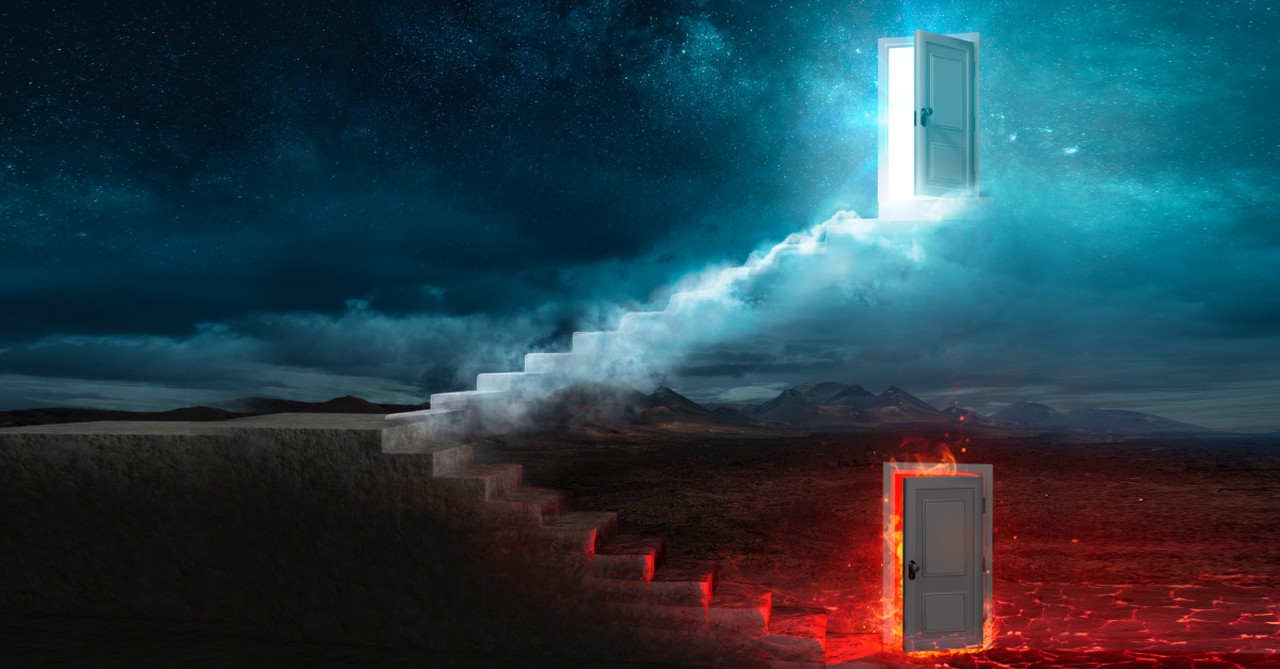
Hell is a topic that has fascinated and troubled people since ancient times. It is a place often associated with divine punishment, eternal suffering, and fiery torment. However, what many Christians believe about hell may not align with what the Bible actually teaches. Hell is a complex and challenging subject for many people. A majority of U.S. adults say they believe in hell – 62 percent overall, and 79 percent of those who are Christians – according to a recent Pew Research Center survey. But many myths about hell are popular in our culture. It’s important for believers to discern between popular misconceptions and what the Bible says about hell. So, let’s consider five common beliefs about hell that are not biblically supported.
Photo Credit: ©Getty Images/Ig0rZh
Myth 1: God sends people to hell.

Myth 1: God sends people to hell.
SLIDE 1 OF 5
Unfortunately, many people believe that it is God who chooses to send people to hell. That’s not true, however. God does not send people to hell; instead, people send themselves there. When people choose to separate themselves from God by rejecting his offer of eternal salvation, they send themselves to hell. 2 Peter 3:9 points out that God wants everyone to be saved: “The Lord is not slow in keeping his promise, as some understand slowness. Instead, he is patient with you, not wanting anyone to perish, but everyone to come to repentance.” In Matthew 18:12-14, Jesus tells a parable about a caring shepherd with 100 sheep who is willing to leave 99 of them to go look for one that wandered off. In verse 14, Jesus says that God has that same caring dedication to help spiritually wandering people: “In the same way your Father in heaven is not willing that any of these little ones should perish.” However, because God is loving, he respects human free will and allows us to accept or reject relationships with him. The Bible reveals in Romans 1:18-20 that people willfully rebel against God by making sinful choices, even though God has clearly revealed himself to them through his creation: “The wrath of God is being revealed from heaven against all the godlessness and wickedness of people, who suppress the truth by their wickedness, since what may be known about God is plain to them, because God has made it plain to them. For since the creation of the world, God’s invisible qualities – his eternal power and divine nature – have been clearly seen, being understood from what has been made, so that people are without excuse.” God has given us plenty of opportunities to discover the wonder of his work in our lives. So, we don’t have any excuses for not taking those opportunities to get to know God. Hell is a place of separation from God. It’s crucial to recognize that God respects human autonomy and allows us all to make our own decisions – even if those decisions result in separation from him. God has given all people the freedom to choose their afterlife destinations, and he hopes we choose heaven rather than hell.
Photo Credit: ©iStock/Getty Images Plus/wacomka
Myth 2: People who aren’t good enough for heaven go to hell.

Myth 2: People who aren’t good enough for heaven go to hell.
SLIDE 2 OF 5
The determining factor in whether people go to heaven or hell is not how morally good or bad they are. Instead, what determines where they go is whether or not they accept the gift of Jesus’ sacrifice for their sins. God offers everyone a chance to go to heaven, regardless of how good or bad their actions have been during their earthly lives. No one can be good enough on their own merits to be in heaven with our perfectly holy God. No one can be bad enough to be beyond the reach of God’s grace and mercy. Our afterlife destination isn’t about our morality; it’s about whether or not we have trusted Jesus to save us. In John 3:15, Jesus declares that “everyone who believes may have eternal life” with God. John 3:16-18 reveals: “For God so loved the world that he gave his one and only Son, that whoever believes in him shall not perish but have eternal life. For God did not send his Son into the world to condemn the world, but to save the world through him. Whoever believes in him is not condemned, but whoever does not believe stands condemned already because they have not believed in the name of God’s one and only Son.” So, people who aren’t good enough for heaven can still go there after they accept Jesus’ sacrifice to save their souls. They only end up in hell by choosing not to accept the salvation God offers them.
Photo Credit: ©Getty Images/Romolo Tavani
Myth 3: Hell is only for extremely evil people.

Myth 3: Hell is only for extremely evil people.
SLIDE 3 OF 5
The Bible does not say that hell is reserved solely for the worst evildoers, such as serial killers. Rather, it says in Romans 3:23 that “all have sinned and fall short of the glory of God.”. This means that everyone is in need of God’s mercy and forgiveness to avoid hell and go to heaven – even those of us who make mostly good decisions. Thankfully, Jesus serves as our advocate when we trust him. Romans 3:22 tells us, “This righteousness is given through faith in Jesus Christ to all who believe.” But when people choose not to believe in God – even when they’re good people – they end up separated from God in hell. God is perfect (Psalm 18:30), so he can’t allow any corrupting sin in heaven where he lives. Heaven is a realm of perfect holiness, and God can’t admit anyone who clings to their sin. We must allow God to purify us from all of our wrongdoing (not just extreme evil), transforming us into righteous beings through Jesus’ sacrifice for us, as 2 Corinthians 5:21 describes: “God made him who had no sin to be sin for us, so that in him we might become the righteousness of God.” Our own efforts at goodness will always fall short of God’s perfect standard, but by faith in Jesus, we are credited with his righteousness. Ephesians 2:8-9 emphasizes this truth: “For it is by grace you have been saved, through faith – and this is not from yourselves, it is the gift of God – not by works, so that no one can boast.” Heaven is not a reward for our personal goodness but a gift of God’s grace to those who trust in the redemptive work of Jesus. So, plenty of people who are not evil – but who are less than perfect – can miss out on heaven and end up in hell by refusing to accept saving relationships with Jesus. John 3:18 explains: “Whoever believes in him is not condemned, but whoever does not believe stands condemned already because they have not believed in the name of God’s one and only Son.” It’s a tragic reality that many people choose to trust themselves more than God, and in the process, send themselves to hell when God wants them to be with him in heaven. It is through accepting the righteousness of Jesus Christ that we gain access to eternal life.
Photo Credit: © Unsplash/Guille Pozzi
Myth 4: Hell is a place underground where people are physically punished.

Myth 4: Hell is a place underground where people are physically punished.
SLIDE 4 OF 5
Popular culture’s depictions of hell often present it as a place underground on Earth that’s full of fire, where people are suffering physically from burns and torture. However, the Bible does not actually say where hell is located, and it focuses more on spiritual suffering than on physical suffering there. Jesus does use the imagery of fire when he speaks of the “fire of hell” (Matthew 5:22 and Matthew 18:9) and in other places – such as when he says in Matthew 13:41-42: “The Son of Man will send out his angels, and they will weed out of his kingdom everything that causes sin and all who do evil. They will throw them into the blazing furnace, where there will be weeping and gnashing of teeth.” But the Bible often emphasizes the spiritual anguish of hell – separation from God – rather than physical torment there. In 2 Thessalonians 1:8-9, we read about punishment in hell, and the ultimate tragedy of being shut out from God’s loving presence: “He will punish those who do not know God and do not obey the gospel of our Lord Jesus. They will be punished with everlasting destruction and shut out from the presence of the Lord and from the glory of his might.” Jesus emphasizes the eternal destiny of the soul – not the physical body – when he warns in Matthew 10:28, “Do not be afraid of those who kill the body but cannot kill the soul. Rather, be afraid of the One who can destroy both soul and body in hell.”
Photo Credit: ©GettyImages/FOTOKITA
Myth 5: Satan is the ruler of hell.

Myth 5: Satan is the ruler of hell.
SLIDE 5 OF 5
Another common belief is that Satan rules over hell. However, the Bible doesn't support this idea. Satan is not the master of hell, but rather a condemned being who will share in its punishment. Revelation 20:10 reveals a vision of the future for Satan (who is also known as the devil) and other demons: “And the devil, who deceived them, was thrown into the lake of burning sulfur, where the beast and the false prophet had been thrown. They will be tormented day and night for ever and ever.” Hell is a place of punishment for Satan and his followers, not his kingdom. The Bible does not say that the devil is the ruler of hell. It simply says that he is “the prince of this world” (John 12:31) and “the god of this age” (2 Corinthians 4:4). But Matthew 25:41 reveals that God has planned an “eternal fire prepared for the devil and his angels.” Demons like Satan know that they are destined for punishment in hell. In Matthew 8:29, two demons yell at Jesus: “’What do you want with us, Son of God?’ they shouted. ‘Have you come here to torture us before the appointed time?’” So, Satan doesn’t rule over hell. Instead, he will suffer there along with other beings who don’t accept God’s love for them.
Conclusion
Exploring what the Bible truly teaches about hell can help us dispel common myths and foster a deeper understanding of this challenging topic. It’s important for us as believers to approach the study of hell with humility, relying on biblical truth to guide our understanding. While hell is a place of punishment, we should remember that God’s mercy and grace are profound. God’s desire is for everyone to choose relationships with him and live in heaven – not hell.
Photo Credit: ©iStock/Getty Images Plus/CasPhotography

Originally published September 25, 2023.







